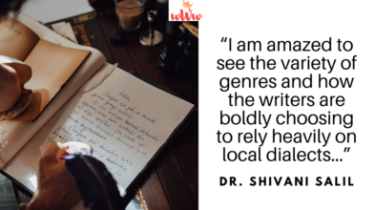Riding On The Win

Saturdays With Shivani
A lot happened in this week that elicited some strong reactions (some good, some not so good) from me. I contemplated writing on a few of them but I think I need to distance myself from them for a while for the sake of some objectivity and perspective. This week allow me to share my thoughts on the Geetanjali Shree’s historical International Booker Prize win.
Naturally it is a huge reason to cheer and to feel proud of but beyond the obvious, it is a reason to be celebrated on many levels. I think it is a validation of sorts that honest writing is appreciated in any language the writer chooses to write in. This also makes me want to cling on to the optimism that it will encourage writers to write in the language they are comfortable in.
For a country that is obsessed with English, this is a good time to relook into its roots. The hangover from British Raj may have started it but the elitist status that English still enjoys in our country has definitely been a huge driving force in according a tier two status to our Indian languages. Speaking for myself, I discovered the beauty of Hindi much later (and I insist on putting the blame on how it is taught in our curriculum). I have often heard my mother, a passionate teacher herself, lament that in this mad rush to learn English often students are unable to develop a strong expression in any language; neither English nor their mother tongue. Just like the aphorism, dubidha main dou gaye maya mili na ram (if you run after two hares, you will catch neither). While we can’t do away with English, we can make an honest attempt to restore some of the lost glory of our rich languages.
This win also shines the spotlight on translation (make that ‘good translation’). The purists maintain that translation mars the beauty and rightly so. A friend who was recently watching the cult movie Deewar pointed out how a pathetic translation can reduce the iconic ‘mere paas ma hai’ to I have mom! Translation entails huge responsibility. It is a tight rope to walk on but a well-done translation makes the original accessible to so many more to enjoy and to relish.
Speaking of translations and subtitles, I have spent many a Sunday afternoon watching movies in regional languages that our good old Doordarshan used to air in the 80s and early 90s. That is the power of good content. Nowadays regional movies have become fairly accessible because of the OTTs and my love affair with them continues unabated. I notice another wonderful trend emerging because of these OTTs- the web series.
I am amazed to see the variety of genres and how the writers are boldly choosing to rely heavily on local dialects and regional languages in mainstream Hindi web series. If Family Man had liberal doses of Tamil, the recently released Nirmal Pathak ki Ghar Wapsi has its characters breaking into fluent Bhojpuri. Though I can’t comment on the former, the subtitles of latter do justice to the dialogues. While the hard-nosed snobs who argue against this ‘contamination’ I think this choice is doing us a huge favour. One, it lends authenticity to the characters and the narrative and two, it steers us away from the stereotypes that we have been fed over the years (Remember the heavily accented Hindi mouthed by caricature like characters- the token sardar ji or a ‘Madraasi’). Also, it is definitely scoring over those cringy, half- hearted ‘Hinglish’ web series that the audience is busy rejecting left, right and center.
This reminds me of my MFA classes where the discussions would often veer to the dilemma of the writers who choose to write in English but it’s not their first language. The consensus was that such writers could allow themselves to lapse into their language occasionally and if done judiciously, it could augment their writing. These web series are a proof of how a tempering of regional languages, just like that famous Indian tadka, is bringing out the flavour of our rich languages and culture into our living rooms. The audience is lapping it up and left wanting for more.
These are interesting times to live in, both as a reader and a writer, where the rules of writing are constantly being challenged and broken. Here’s to Geetanjali Shree for giving us the pride in our identity, the feeling that we may have arrived and to the hope that many more honest voices will follow her conviction.
